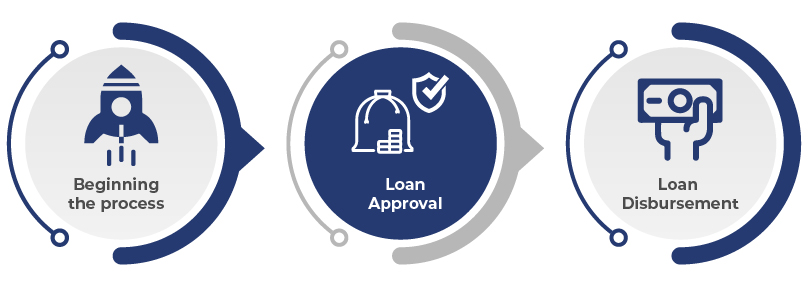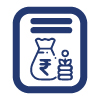The personal loan disbursal in India has doubled in recent years, whereas the value of loans increased from ₹5,907 crore to ₹40,845 crore. It's just not the Personal Loan market that has increased; the Personal Loan disbursement process has also gotten better, simpler and faster. The process ensures that you, as a borrower, get access to funds as quickly and conveniently as possible. The speed at which the loan is disbursed is one of the many reasons why personal loans are popular.
In this blog, we will explore the entire process from application to funds credited into your account.
What is Personal Loan Disbursement?

The Personal Loan disbursement refers to the process where a lender credits the sanctioned amount into the borrower's account after the loan approval. It involves releasing the approved loan amount and crediting it to the borrower's account. It's the last phase of the loan application and approval process.
Personal Loan Disbursal Process Explained
Personal Loan offers one of the easiest and most accessible ways of getting funds. It offers you complete flexibility to use for everything from medical bills to house renovation. If you know all the steps involved in the loan disbursement process, you can complete all the formalities on time and get the loan quickly.
Step 1: Application and Approval: Where Your Loan Journey Begins
The first step toward loan disbursement is submitting a loan application. The process starts when you apply for a Personal Loan, either online or at a physical location. Here is how you can initiate the Personal Loan application process:
● Provide your personal, financial, employment, and
loan-specific information.
● Upload documents such as ID,
income, and address proof.
You'll receive confirmation of your eligibility from the lender after the lender reviews your application. In comparison, traditional banks may take 2-5 days for approval, depending on the volume of documents and the speed of verification procedures.
Accuracy is important in the loan application. Even minor errors,
like a misspelt name or incorrect date of birth, can cause delays in
your loan disbursement. It could even lead to loan rejection.

Step 2: Document Submission
After your loan application is submitted, the next step is to provide relevant documents. These documents are important for verifying your identity and address:
|
Proof of Identity |
Aadhaar card, PAN card, passport, voter ID |
|
Proof of Address |
Utility bills, rental agreement, driving licence, passport |
|
e-KYC |
PAN Card |
|
Proof of Income |
|
While traditional lenders like banks may still ask you to submit these documents, most lenders nowadays follow a completely digital process. You can scan your documents and upload them online or fetch them from DigiLocker for faster application, approval, and disbursement.

ID proof | 
Income proof | 
Income Tax Return (ITR) |

Address proof | 
Bank details | 
Two passport size photographs |
Step 3: Primary Eligibility Check
The bank or NBFCs perform an instant eligibility check to eliminate applicants who do not match fundamental requirements. Here are all the factors that a lender considers to confirm your eligibility:
● Age, usually between 21 and 65 years
● Must be an
Indian citizen
● Employment type (salaried or
self-employed)
● Work experience
● Income
●
Credit score
Also Read: How to Increase Your Personal Loan Eligibility Without a Salary Hike
4: Risk Assessment & Credit Appraisal
After a quick eligibility check, usually banks and NBFCs conduct a deep analysis of your loan application to gauge financial risk and credit in detail. The optimal Debt-to-Income (DTI) ratio must be less than 30% for seamless loan repayment. The upper limit shouldn't go above 40% of your net income, as beyond this could indicate a risk.
The same parameters are followed by several other banks and NBFCs, who view a DTI of 35–40% as acceptable, with anything lower being more advantageous.
Step 5: Loan Offer Generation
If you qualify for a Personal Loan, banks or lenders will promptly issue a customised loan offer, often within minutes. The offer will include the sanctioned loan amount, affordable interest rate, payback terms, and processing fee.
The offer also specifies crucial aspects such as prepayment choices, late payment fees, and relevant GST, allowing you to make an informed decision. It is important to carefully examine the offer, the overall cost of borrowing, and select terms suitable for your repayment ability. This will lead to seamless loan disbursement.
Also Read: What are the Benefits of a Pre-Approved Personal Loan?
Step 6: Agreement and E-KYC
You must complete e-KYC with the help of Aadhaar OTP authentication to proceed with the loan application. Once the KYC is done, you can review the loan terms and conditions to accept it digitally. This agreement usually includes repayment terms, any charges for late payments, and prepayment or foreclosure conditions.
Step 7: Final Approval and Loan Disbursement
Once all checks are completed and the documentation is in place, your application will move to the final stage: approval and loan disbursement.
● Loan Drawdown Request: Once your
application has been granted, you must submit a request to avail the
loan.
● Funds Transfer: Following your
withdrawal request and approval, the loan disbursement takes place
directly to the bank account you have provided.
Sometimes, the loan amount is disbursed but not credited. In that case, quickly verify your bank details with the lender and ensure all your documents are signed. This may help prevent delays and ensure a timely loan disbursement.
Factors that Influence Personal Loan Disbursement
The speed and efficiency of the Personal Loan disbursement are based on these factors involving the borrower and lenders:
● Credit Score and History: A low score
can lead to further delay or even rejection, which can cause
delays in disbursement. This is why your credit score must be at
least 750 or above.
● Stability of income and type of
employment: Regular monthly earnings, either through salary
or business, assure lenders of your ability to repay. Stable jobs in
well-established organisations lead to faster loan disbursement.
● Current Debt Liabilities: A large
debt-to-income (DTI) ratio is an indication of over-leverage. In case
the borrower is already paying off several loans or credit cards,
lenders will take more time to assess risks.
● Amount
and Tenure Requested: Large loan amounts will involve more
thorough evaluation, such as employer checks and income documentation.
This will slow the process.
● Precision in the
Documentation: The most common causes of delays are missing
or wrong KYC information, income documents, or bank statements. By
submitting correct and complete documents, the verification process
will be easier.
● Application Mode: Digital
lenders and banks that use digital verification systems can approve
loans in 24-48 hours, whereas the offline application process can take
longer since it needs manual verification.
To Conclude
A speedy Personal Loan disbursement can mean the difference
between meeting the financial objective and missing it completely.
This is why understanding the Personal Loan disbursal process is
important. It helps you improve your chances of getting funds
urgently in crucial situations.
This is why at Poonawalla
Fincorp, we have designed our loan application process to be simple
and disbursal faster. Apply
for a Personal Loan of up to ₹50 lakh with quick disbursal.
The speed at which the loan amount is credited into your account
allows you to meet all your financial objectives.
FAQs
How much time does it take for a Personal Loan
application?
The processing time for a Personal Loan
application can vary from a few minutes to 3-4 days. This normally
depends on the lender, your credit history, and the list of
documents that you are submitting. Digital lenders usually process
applications more quickly than traditional banks.
What should I do when the loan amount is disbursed but
not credited?
Get in touch with the bank to find out
if your account has received any transactions. If the bank hasn't,
contact your lender to inquire about the status of the transaction
and the anticipated processing time.
What is the role of KYC verification in a Personal
Loan disbursed?
KYC (Know Your Customer)
verification helps to check the authenticity of your identity and
address. It’s compulsory to do KYC while applying for a loan. It
speeds up your loan approval process.
Can personal loans be disbursed on weekends or bank
holidays?
Disbursements usually occur on business days
and hours. However, some digital lenders and banks that use
real-time payment systems may conduct disbursements on weekends.
Can I change the disbursement account after my loan is
approved?
Yes, however, you need to provide a request
in writing and verification of the new account. This may cause a
delay in disbursement because the lender has to verify the new information.
What can be the reason for a sanctioned loan getting
delayed in disbursement?
Most often, it is due
to missing documents, delayed KYC verification, system failure at
the bank, or audits of compliance performed before the final transfer.
We take utmost care to provide information based on internal data and reliable sources. However, this article and associated web pages provide generic information for reference purposes only. Readers must make an informed decision by reviewing the products offered and the terms and conditions. Loan disbursal is at the sole discretion of Poonawalla Fincorp.
*Terms and Conditions apply